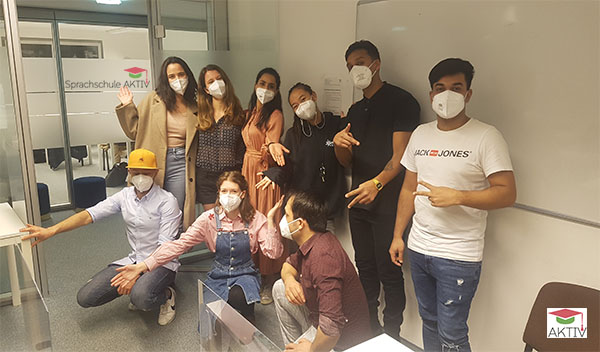“What’s mine is yours” – The possessive pronoun in German
Show a property by Possessivpronomen
Pronouns are small words that describe a noun in more detail. “Possessive pronouns” describe possession more precisely, they are also called possessive pronouns. Possessive pronouns are declinable. This means that they change depending on the context in which they are used. In order to learn German, it makes sense to learn this important group of pronouns through some exercises.
Possessive pronoun – When is this pronoun used?
Possessive pronouns indicate how something relates to something else or what affiliation exists. For example, they describe the property (my house), but also characteristics and feelings (my hunger, my fear) or relatives (my brother, my stepmother). Pronouns are suitable for describing various circumstances in more detail and making a relationship clear.
How are the German possessive pronouns declined?
These pronouns change according to numerus and genus. A distinction is made between singular (singular) femininum, masculinum and neuter and plural (plural) of the speaker and the corresponding object.
The pronouns in their basic form:
Singular:
Femininum: “Das ist meine Freundin.”.
Masculine: “Das ist mein Bruder”.
Neutrum: “Das ist mein Klavier”.
As a donkey’s bridge, you can remember that feminine pronouns have a -e attached to them. Words of the category Masculinum and Neutrum do not have this. In the plural, a -e is appended again, regardless of the gender of the corresponding noun:
Plural forms:
“Das sind meine Brüder” (Maskulinum).
“Das sind ihre Kinder” (Neutrum).
“Dies sind deine Münzen” (femininum).
German grammar: exercises for daily use
In every German course there is a point at which the vocabulary is linked to form meaningful sentences. Pronouns play an important key role and are suitable for every learning level. Pronouns are common and represent an important chapter.
There are several ways to ask for possessive pronouns:
“Wessen Buch ist das?”
“Wem gehört das?” And “Wessen ist das?” are certainly the two most unambiguous.
“Wem gehört dieses Buch?”
You can answer that with a possessive pronoun: “Das ist mein Buch.”
Possessive pronoun exercises and solutions
- Ich bin zu (ich) ______ Eltern gefahren.
- (ich) ____ Tante kocht uns immer gutes Essen.
- Du hast beschlossen (du) _____ Sprachkenntnisse zu verbessern.
- (sie) _____ Freundin kommt heute zu Besuch.
- Ihr habt (Ihr) _____ Pläne für nächste Woche gut durchdacht.
- Er hat (er) _____ Freund abgesagt.
- (wir) ______ Prüfung werden wir sicher bestehen.
- Sie wird sich (sie) ______ Essen kaufen gehen.
- Wir arbeiten an uns um (wir) _____ Ziele zu erreichen.
- Ich habe (ich) _____ Lehrer eine E-Mail geschrieben.
- Ich sagte (ich) _____ Freund, dass er mir vertrauen sollte.
- (ich) _____ Freundin hat gesagt, Sie wird mir bei (ich) _____ Übungen helfen.
- Sie kann heute nicht rechtzeitig zu (sie) _____ Termin kommen.
- (du) ____ Lehrer ist viel besser als (er) _____.
- Wie war (ihr) ____ Spaziergang? Habt ihr (ihr) _____ Sonntag genießen können?
Solutions: 1.meinen 2.Meine 3.deine 4. Ihre 5. Eure 6. Seinem 7. Unsere 8. Ihr 9.unsere 10. Meinem 11.meinem 12. Meine, meinen 13. Ihrem 14. Dein, seiner 15. Euer, euren
A German course to learn German for free
In order to get an overview, we offer exercises on various topics. The pronouns and possessive pronouns represent a large block of topics. On our pages you will find offers that are free of charge, so feel free to browse through the various grammatical topics.
Repeat and practice: Practice does it
For people who want to learn German, it is easier to learn in conversation and conversation. Grammar as a theoretical basis is very important to make it clear what is at stake and how the language is structured. Pronouns and possessive pronouns are an important part of everyday language use in order to be able to express more precisely what the speaker means and formulate in more detail. This begins with “my coffee” in the morning, continues with “our lunch break” and ends with “your closing time”. Possessive pronouns make language more fluent and understandable. In our language courses you learn to speak in groups. You will apply the grammatical rules directly with other students and will be guided and corrected by our competent teachers. You will consolidate your language skills through the many everyday exercises and repetitions.














